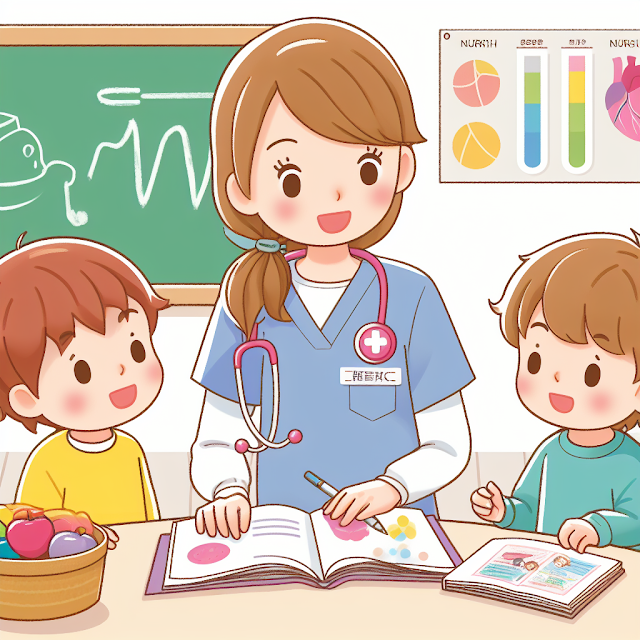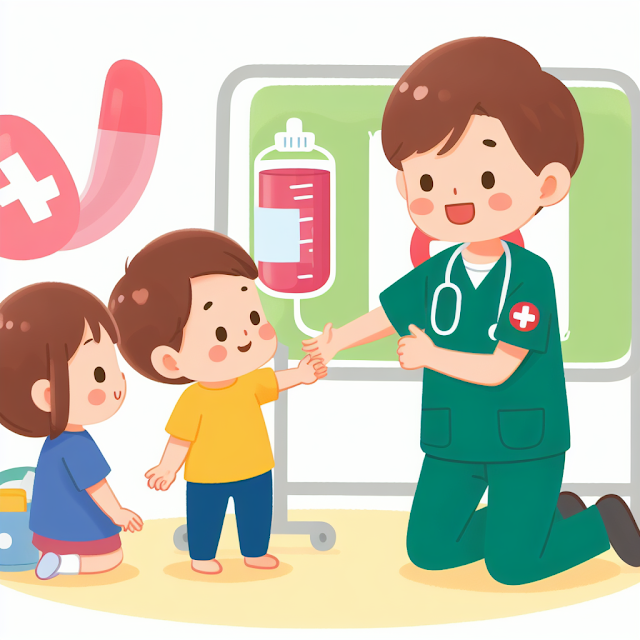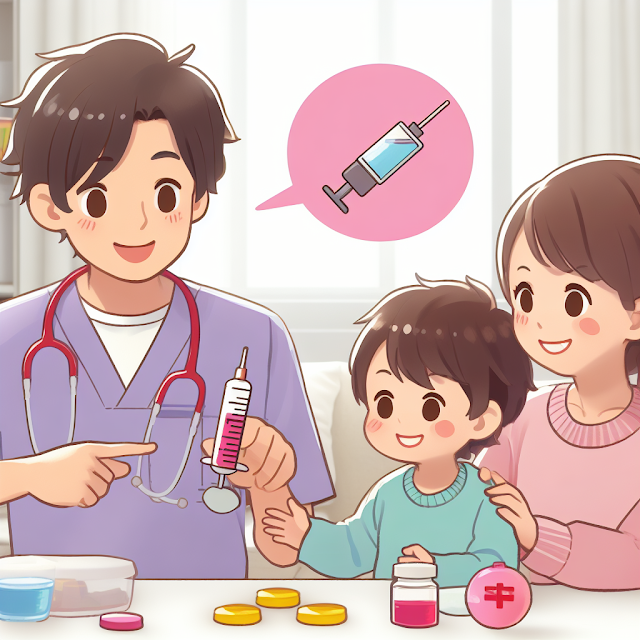Empowering the Next Generation of Healthcare Heroes: Inspiring Children to Become Nurses
Have you ever wondered how hospitals and clinics manage to keep people healthy and happy? It's all thanks to the amazing nurses who work tirelessly behind the scenes providing care and support to patients of all ages.
Nurses are the backbone of the healthcare system, and they play a vital role in ensuring that patients receive the best possible care. From providing basic medical care to administering medications, nurses are there every step of the way, offering comfort and support to those in need.
But have you ever thought about how children view nurses? Do they see them as superheroes, or just as people in white coats who give shots? Introducing children to the world of nursing at an early age can spark their interest in this noble profession and encourage them to consider a career in healthcare.
In this blog post, we'll explore the importance of teaching children about nursing and provide some fun and engaging activities that you can use to introduce your kids to this rewarding career path. So, let's get started!
What is nursing?
Imagine a world without nurses. Hospitals would be chaotic, patients would be confused and scared, and the quality of healthcare would plummet. Nurses are the unsung heroes of the medical world, playing a crucial role in ensuring that patients receive compassionate and effective care.
But what exactly does a nurse do? In simple terms, nurses are responsible for providing direct care to patients of all ages. Their duties encompass a wide range of tasks, from administering medications and monitoring vital signs to providing emotional support and educating patients about their health conditions.
Let's take a closer look at some of the specific tasks that nurses perform:
- Providing basic medical care: This includes tasks such as dressing wounds, taking temperatures, and assisting with bathing and grooming.
- Administering medications: Nurses are responsible for ensuring that patients receive the correct medications at the right time and dosage.
- Monitoring vital signs: This includes checking blood pressure, heart rate, and respiration to track a patient's condition.
- Providing emotional support: Nurses are often the first responders to patients' emotional needs, offering a listening ear and words of comfort.
- Educating patients: Nurses play a vital role in educating patients about their health conditions, treatment plans, and lifestyle changes they can make to improve their health.
In addition to these core duties, nurses also collaborate with doctors, social workers, and other healthcare professionals to provide comprehensive care for their patients. They are the glue that holds the healthcare system together, ensuring that patients receive the seamless care they deserve.
Why is it important to teach children about nursing?
Introducing children to the world of nursing at an early age can have a profound impact on their future, both personally and professionally.
By exposing them to the many facets of nursing, we can spark their interest in this rewarding career, fostering their compassion, empathy, and understanding of the healthcare system.
Here are some of the key reasons why teaching children about nursing is essential:
- It nurtures compassion and empathy: Nursing is a profession built on compassion and empathy, and these qualities are essential for anyone who wants to care for others. By teaching children about nursing, we can help them develop these important traits, which will benefit them not only in their careers but also in their personal lives.
- It exposes them to the healthcare system: The healthcare system can be a complex and intimidating place, even for adults. By introducing children to nursing at an early age, we can demystify the healthcare system and help them understand the important role that nurses play in keeping people healthy.
- It sparks an interest in STEM fields: Nursing is a science-based profession that requires a strong foundation in biology, chemistry, and anatomy. By introducing children to nursing, we can pique their interest in STEM (science, technology, engineering, and mathematics) fields and encourage them to pursue careers in these areas.
- It promotes career exploration: Nursing is just one of many rewarding careers in the healthcare field. By teaching children about nursing, we can open their eyes to the many possibilities that exist in the healthcare industry and encourage them to explore their options.
- It instills a sense of civic duty: Nurses play a vital role in society, providing care to those who need it most. By teaching children about nursing, we can instill in them a sense of civic duty and encourage them to make a positive impact on the world.
In addition to these benefits, teaching children about nursing can also help them develop critical thinking skills, problem-solving abilities, and strong communication skills.
These are all essential qualities that will serve them well in any career path they choose.
How to teach children about nursing
Introducing children to nursing can be a fun and engaging experience. Here are some age-appropriate activities that you can use to introduce your kids to this rewarding career path:
For young children (3-5 years old)
Play doctor or nurse: This classic role-playing game is a great way to introduce children to the concept of nursing and let them explore the different roles of healthcare professionals.
- Read stories about nurses: There are many children's books that feature nurses as protagonists, helping children understand the importance of their work and the qualities that make a good nurse.
- Watch educational videos about nursing: There are many age-appropriate videos available online that can teach children about the different aspects of nursing in a fun and engaging way.
For older children (6-8 years old)
Visit a local hospital or clinic: Arrange a tour of a hospital or clinic with your child to give them a firsthand look at the work environment of nurses.
- Attend a health fair or community event: These events often have booths featuring nurses who can answer children's questions and provide information about nursing careers.
- Participate in a volunteer project at a local hospital or homeless shelter: This is a great way for children to experience the direct impact that nurses have on the lives of others.
For pre-teens and teenagers (9-13 years old)
Shadow a nurse for a day: This is an excellent way for children to get a real-world glimpse into the day-to-day life of a nurse.
- Enroll in a nursing summer camp or program: Many hospitals and healthcare organizations offer summer camps and programs that teach children about nursing and other healthcare careers.
- Encourage research and exploration: Help your child research different nursing specialities and explore the educational requirements and career paths for nurses.
For all ages
Talk to nurses you know: Ask friends, family members, or neighbors who are nurses to share their experiences and insights with your child.
- Watch documentaries or movies about nursing: These can provide a more in-depth look at the challenges and rewards of nursing careers.
- Read articles and blog posts about nursing: There are many online resources that can provide up-to-date information about nursing careers.
By incorporating these activities into your child's life, you can help them develop a deeper understanding of nursing and inspire them to consider this noble profession as a future career path. Remember, it's never too early to plant the seeds of inspiration in a child's mind.
The qualities of a good nurse
Nursing is a demanding yet rewarding profession that requires a unique blend of skills, personality traits, and values.
While there are many different paths within nursing, all good nurses share certain essential qualities.
- Compassion and Empathy: At the heart of nursing lies compassion, the ability to understand and share the feelings of others. Nurses must be able to connect with their patients on an emotional level, offering comfort and support during difficult times.
- Communication Skills: Nurses are the bridge between patients, doctors, and other healthcare professionals, making clear and effective communication crucial. They must be able to explain complex medical information in a way that patients can understand and listen attentively to their concerns.
- Critical Thinking and Problem-Solving: Nursing often involves making quick decisions under pressure, requiring strong critical thinking and problem-solving abilities. Nurses must be able to assess situations, identify potential problems, and implement effective solutions.
- Attention to Detail: Nurses handle a wide range of tasks, from administering medications to monitoring vital signs. A keen eye for detail is essential to ensure patient safety and prevent errors.
- Stamina and Adaptability: Nursing can be physically and emotionally demanding, requiring stamina and adaptability. Nurses must be able to work long shifts, handle unexpected situations, and adapt to changes in patient needs.
- Integrity and Advocacy: Nurses play a vital role in advocating for their patients' rights and well-being. They must uphold ethical standards, maintain patient confidentiality, and ensure that patients receive the best possible care.
- Willingness to Learn: The field of medicine is constantly evolving, making lifelong learning an essential quality for nurses. They must be open to new knowledge, embrace new technology, and continuously update their skills.
Frequently Asked Questions (FAQs)
What is the best age to start teaching children about nursing?
There is no one-size-fits-all answer to this question, as the best age to start teaching children about nursing will depend on the individual child's maturity and interests. However, it is generally recommended to start introducing children to the concept of nursing at a young age, perhaps around 3-5 years old. This can be done through simple activities such as playing doctor or nurse, reading stories about nurses, or watching educational videos about nursing.
How can I make learning about nursing fun and engaging for children?
There are many ways to make learning about nursing fun and engaging for children. Some ideas include:
Use age-appropriate activities: Choose activities that are appropriate for the child's age and interests. For younger children, this might include playing doctor or nurse, reading stories about nurses, or watching educational videos about nursing. For older children, this might include shadowing a nurse, visiting a hospital or clinic, or participating in a volunteer project at a local hospital or homeless shelter.
Make it interactive: Get the child involved in the learning process by asking questions, playing games, and letting them experiment.
Make it relevant: Connect the learning to the child's own life experiences. For example, if a child has a friend or family member who is a nurse, talk to them about their experiences.
What are some resources that I can use to teach children about nursing?
There are many resources available to help teach children about nursing. Some ideas include:
Books: There are many children's books that feature nurses as protagonists. These books can help children understand the importance of nurses' work and the qualities that make a good nurse.
Videos: There are many age-appropriate videos available online that can teach children about the different aspects of nursing in a fun and engaging way.
Websites: There are many websites that provide information about nursing careers, including educational requirements, job prospects, and salary expectations.
What are the benefits of teaching children about nursing?
There are many benefits to teaching children about nursing. Some of the benefits include:
- Nurturing compassion and empathy: Nursing is a profession built on compassion and empathy, and these qualities are essential for anyone who wants to care for others. By teaching children about nursing, we can help them develop these important traits, which will benefit them not only in their careers but also in their personal lives.
- Exposing them to the healthcare system: The healthcare system can be a complex and intimidating place, even for adults. By introducing children to nursing at an early age, we can demystify the healthcare system and help them understand the important role that nurses play in keeping people healthy.
- Sparking an interest in STEM fields: Nursing is a science-based profession that requires a strong foundation in biology, chemistry, and anatomy. By introducing children to nursing, we can pique their interest in STEM (science, technology, engineering, and mathematics) fields and encourage them to pursue careers in these areas.
What are the qualities of a good nurse?
In addition to the core qualities of compassion, empathy, communication skills, and critical thinking, good nurses also possess a strong work ethic, a sense of humor, and a genuine passion for helping others. They are the unsung heroes of the healthcare system, dedicating their lives to improving the lives of others.
What are some ways to encourage children to consider a career in nursing?
There are many ways to encourage children to consider a career in nursing. Some ideas include:
- Talk to them about the importance of nursing: Explain to them how nurses play a vital role in society and how they help people every day.
- Expose them to nurses: Take them to visit a hospital or clinic and talk to nurses about their work.
- Encourage them to volunteer in a healthcare setting: This will give them hands-on experience and help them see the impact that nurses have on patients' lives.
- Support their education: Help them research nursing programs and provide financial assistance if needed.
Is nursing a good career choice for children?
Nursing is a rewarding and challenging career that can be a great fit for children who are compassionate, empathetic, and have a strong work ethic. There is a high demand for nurses, and the job outlook is excellent. Nurses also have the opportunity to make a real difference in the lives of others.
Final Thoughts
In addition to these core qualities, good nurses also possess a strong work ethic, a sense of humor, and a genuine passion for helping others. They are the unsung heroes of the healthcare system, dedicating their lives to improving the lives of others.
Nursing is a noble profession that plays a vital role in the healthcare system. Nurses provide compassionate and effective care to patients of all ages, working tirelessly to ensure their well-being.
By teaching children about nursing at an early age, we can spark their interest in this rewarding career path, nurture their compassion and empathy, and encourage them to make a positive impact on the world.
Through age-appropriate activities such as role-playing, reading stories, and visiting hospitals, we can introduce children to the many facets of nursing and help them develop a deeper understanding of this important profession.
By highlighting the qualities of a good nurse, such as compassion, communication skills, and critical thinking, we can inspire children to aspire to this noble profession.
So, are you ready to plant the seeds of inspiration in a child's mind and nurture their potential to become a future nurse?



